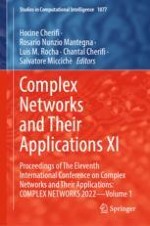
2023 | OriginalPaper | Buchkapitel
Cognitive Cascades within Media Ecosystems: Simulating Fragmentation, Selective Exposure and Media Tactics to Investigate Polarization
verfasst von : Nicholas Rabb, Lenore Cowen
Erschienen in: Complex Networks and Their Applications XI
Aktivieren Sie unsere intelligente Suche, um passende Fachinhalte oder Patente zu finden.
Wählen Sie Textabschnitte aus um mit Künstlicher Intelligenz passenden Patente zu finden. powered by
Markieren Sie Textabschnitte, um KI-gestützt weitere passende Inhalte zu finden. powered by